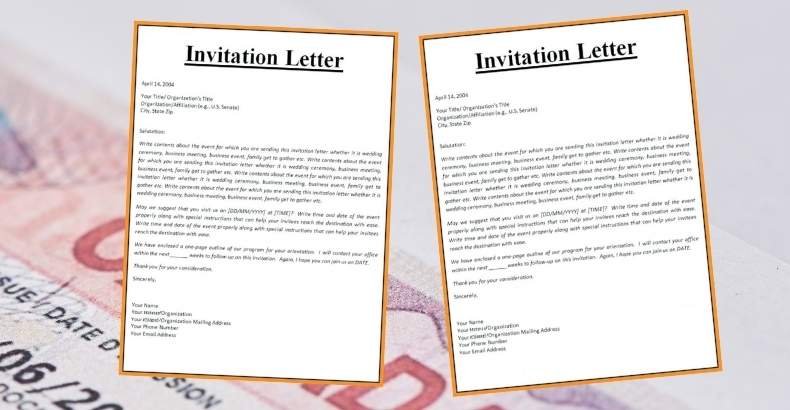Attending a conference in Canada offers a chance to engage with leading professionals and expand your knowledge in your field. These events attract participants from around the world, encouraging collaboration and networking.
However, participants from outside Canada who wish to attend conferences must apply for visas. Now you might be wondering, “How to get a visa for a conference in Canada?”
The process usually begins with determining the proper visa type, such as a visitor visa or an Electronic Travel Authorization (eTA). You will need a valid passport, an invitation letter, and proof of financial means. A successful visa application requires a complete application and payment of the necessary fees.
Are you curious about the specific steps involved in obtaining a visa? This article will guide you through everything you need to know to ensure a smooth and successful application process for your conference in Canada. Keep reading for all the essential details!
Why Do You Need a Visa to Attend a Conference in Canada?
If you’re planning to attend a conference in Canada and you’re from a country that requires a visa to enter, you must apply for one in advance. Canada’s immigration laws mandate that visitors from specific countries must have a visa, even if they are only visiting for a few days to attend a conference.

A visa is essential because it allows you to legally enter and stay in Canada for the duration of the event. Even if the conference is just for a few days, failure to secure a visa can result in being denied entry at the border. This not only affects your ability to attend the event but can also negatively impact future travel to Canada.
For that, you should check your eligibility and determine the visa type you need well in advance. This is especially important for international attendees planning to join the upcoming international conference to meet with professionals and experts and gain insights. The visa application process ensures that Canada maintains control over who enters the country, protecting both its citizens and visitors.
Types of Visas Are Available for Attending Conferences in Canada
Before you apply for a visa, you have to know which type of visa you need for attending a conference in Canada. There are several visa categories available, and choosing the right one depends on the purpose of your visit, your nationality, and how long you intend to stay in Canada.
When attending a conference in Canada, the most common visa types are,
Visitor Visa (Temporary Resident Visa – TRV)
Most international conference attendees will need a visitor visa. This visa allows you to enter Canada for a short period, typically up to six months. The visitor visa is suitable for attendees, exhibitors, and speakers who are participating in a conference but do not have any intention of staying in Canada beyond the event. It’s important to note that the visitor visa does not permit you to work or receive any payment for attending the event.
Electronic Travel Authorization (eTA)
If you are from a visa-exempt country, you may only need an Electronic Travel Authorization (eTA) to attend the conference. The eTA is electronically linked to your passport and allows entry into Canada by air. It’s usually quicker and simpler to apply for than a traditional visa. However, the eTA is only available to citizens of visa-exempt countries.
Business Visitor Visa
If you’re attending a conference in Canada on behalf of a company or for business purposes, you may need to apply for a business visitor visa. This type of visa is for individuals participating in conferences, trade shows, or seminars, where they will represent their organization but not engage in paid work or employment within Canada.
Work Permit (for Speakers or Exhibitors)
If you are a speaker, exhibitor, or someone who is receiving payment for attending the conference, you may require a work permit. A work permit is also necessary if you will be involved in activities beyond simply attending or presenting at the event. This permit ensures that you can legally perform tasks that would otherwise require employment authorization in Canada.
How to Get a Visa for a Conference in Canada?
Getting a visa for a conference in Canada involves several important steps that must be followed carefully. It’s essential to start early and make sure all your documents are complete. By following the right process, you can avoid delays and ensure a successful application.

Step 1: Determine the Type of Visa You Need
The first step is to determine which type of visa is appropriate for your visit. As mentioned earlier, you could need a visitor visa, eTA, business visitor visa, or work permit, depending on your circumstances. To better learn about Canada conference visa types, check Canada’s official immigration website to confirm the visa type required based on your nationality and conference role.
Step 2: Gather the Necessary Documents
Once you’ve determined the visa type, gather the required documents for your application. The key documents typically include,
- A valid passport with at least six months of validity remaining.
- A completed visa application form.
- A letter of invitation from the conference organizer.
- Proof of sufficient funds for your stay (e.g., bank statements).
- Proof of ties to your home country, such as employment verification or family.
- Two recent passport-sized photos.
Step 3: Complete the Online Application
Most visa applications for Canada are submitted online. You will need to create an account on the Immigration, Refugees, and Citizenship Canada (IRCC) website and fill out the necessary forms. The online portal will guide you through the required steps, including uploading your documents and paying the application fee. Double-check that all the information provided is accurate before submission.
Step 4: Pay the Application Fee
Visa application fees vary depending on the type of visa you are applying for. For a visitor visa, the fee is usually CAD 100. You can pay the fee online through the IRCC portal using a credit or debit card. Make sure to keep a copy of the payment receipt for your records, as you may need it later in the process.
Step 5: Schedule a Biometrics Appointment
After submitting your application, you may be required to provide biometrics, which include your fingerprints and photograph. You will receive instructions on how to schedule a biometrics appointment at a Visa Application Center (VAC) near you. This step is mandatory for most applicants and must be completed within 30 days of receiving the request.
Step 6: Wait for Processing
Visa processing times vary depending on your location and the type of visa you are applying for. Typically, it can take anywhere from two weeks to several months. During this time, you can track the status of your application online using your account on the IRCC portal. Make sure to respond promptly to any additional requests for information from the visa office.
Step 7: Receive Your Visa and Prepare for Travel
Once your visa is approved, you will receive instructions on how to get your visa stamped in your passport. After that, you are ready to travel to Canada for your conference. Be sure to keep a copy of your visa and important documents with you during your trip. You may be asked to show them at the border when entering Canada.
Key Requirements for a Canadian Conference Visa Application
Applying for a Canadian conference visa requires a specific set of documents and information. Ensuring that you meet all the requirements can make the process much smoother. Missing any critical documents can lead to delays or even a visa refusal. When applying for a Canadian conference visa, the key requirements typically include,
- Valid Passport: Your passport must be valid for at least six months beyond the date of your intended departure from Canada. Ensure that it is in good condition, with no damage that could make it invalid.
- Completed Application Form: The visa application form must be filled out accurately and completely. Providing incorrect or incomplete information can lead to your application being denied.
- Letter of Invitation: Most conference visa applications require a formal letter of invitation from the conference organizers. This letter should outline the event’s details, your role (attendee, speaker, exhibitor), and confirm your registration.
- Proof of Financial Support: You will need to demonstrate that you have sufficient funds to cover your stay in Canada. This could include bank statements, pay stubs, or a letter from your employer indicating that they will cover your expenses.
- Proof of Ties to Your Home Country: To ensure that you do not overstay your visa, Canadian immigration authorities require proof that you have strong ties to your home country. This could be a letter from your employer, proof of property ownership, or family ties.
How Long Does It Take to Get a Visa for a Canadian Conference?
The time it takes to get a visa for a conference in Canada can vary depending on several factors, such as your location and the type of visa you are applying for. Knowing the expected processing times can help you plan your trip better and avoid last-minute delays.

The processing time for a Canadian conference visa usually ranges between two to eight weeks. However, it can sometimes take longer if there are additional requirements or a high volume of applications. To give yourself enough time, it’s recommended to apply at least three months before your conference date.
Here are some factors that can affect how long it takes to process your visa:
- Your Country of Residence: Processing times can vary depending on where you are applying from. Some countries have quicker processing times, while others may take longer due to local visa application procedures.
- Type of Visa: The type of visa you are applying for can also influence the time it takes to receive approval. A Temporary Resident Visa (TRV) might take longer to process than an Electronic Travel Authorization (eTA), especially if additional documentation is required.
- Biometrics and Other Requirements: If you are required to submit biometrics (fingerprints and a photo), this may add time to the process. Biometrics appointments are usually scheduled within a few days of receiving the request, but delays can happen depending on the availability of Visa Application Centers in your area.
- Incomplete Applications: One of the most common reasons for delays is submitting an incomplete or incorrect application. Always double-check that you have included all necessary documents and information.
Avoid Common Mistakes in Your Conference Visa Application
Making mistakes on your visa application can lead to delays or even a rejection. Being aware of common errors and how to avoid them can save you time and ensure a smoother application process.
To avoid common mistakes in your conference visa application, follow these guidelines,
Double-Check Your Application Form
One of the most frequent mistakes is filling out the application form incorrectly or leaving fields blank. Ensure that all the information is accurate and complete. Small errors, like spelling mistakes or incorrect passport numbers, can lead to your application being delayed or rejected. Take the time to review your form before submission.
Submit the Correct Documents
Missing documents are another common reason for visa application delays. Make sure you know exactly what documents are required for your specific visa type. This often includes a valid passport, proof of funds, a letter of invitation from the conference, and proof of ties to your home country. Submitting incomplete documentation can lead to a refusal or a request for additional information, which will slow down the process.
Provide Accurate Financial Information
You must show that you have sufficient funds to cover your stay in Canada. Many applicants make the mistake of providing incomplete or outdated bank statements. Ensure that your financial information is current and meets the requirements set by Canadian immigration authorities.
Use a Valid Passport
Your passport must be valid for at least six months beyond the date of your intended stay in Canada. Some applicants submit applications with passports that are close to expiring, which can lead to complications. If your passport is set to expire soon, renew it before applying for your visa.
Don’t Wait Until the Last Minute
Applying too close to your travel date is a common error that can cause unnecessary stress. Visa processing times can vary, and waiting until the last minute can increase the risk of missing your conference. Aim to submit your application at least three months in advance.
Be Honest on Your Application
Always provide truthful information. Falsifying details, such as misrepresenting your purpose for attending the conference or your financial situation, can lead to a visa denial. Misrepresentation can also impact your ability to apply for a Canadian visa in the future.
Check Local Visa Requirements
Each country may have different local requirements for submitting a visa application. Ensure that you follow your country’s specific guidelines for document submission and biometrics appointments. Not adhering to these local rules can cause significant delays.
Do You Need an Invitation Letter for a Canadian Conference Visa?
An invitation letter is often required when applying for a visa to attend a conference in Canada. This document helps confirm the core purpose of the Canada conference visa and supports your visa application by providing proof of your attendance at the event. Here’s why an invitation letter is important,

- Confirm Your Purpose of Visit: The invitation letter provides clear evidence that your trip to Canada is specifically for attending a conference. It helps Canadian immigration authorities verify that your visit is legitimate and that you plan to leave Canada after the event.
- Supports Your Visa Application: Including the invitation letter with your visa application strengthens your case by showing that you have a valid reason to enter Canada. Without this letter, your application may be viewed as incomplete or less credible, increasing the likelihood of rejection.
- Outlines the Event Details: The invitation letter outlines the name and purpose of the conference, the venue, and the event dates. This helps immigration officers understand the duration of your stay and the nature of your involvement in the conference.
- Provides Contact Information for the Conference Organizers: The invitation letter should include contact details for the conference organizers. This allows Canadian immigration authorities to verify the legitimacy of the event if necessary. Having this information in your application makes it easier for officials to approve your visa.
Are There Special Visa Rules for International Conference Speakers in Canada?
International conference speakers traveling to Canada may be subject to specific visa regulations. While some may only need a Temporary Resident Visa (TRV) or an Electronic Travel Authorization (eTA), others may require a work permit, depending on the nature of their participation and whether they will be receiving payment for their role.
Visitor Visa vs. Work Permit
In most cases, conference speakers who are traveling to Canada to present at an event without receiving payment do not need a work permit. A visitor visa (or eTA, if applicable) will typically suffice. However, if you are being paid for your speaking engagement, you may need to apply for a work permit. Always check with Canadian immigration authorities to determine the specific requirements based on your situation.
Honoraria and Work Permit Exemptions
If you are receiving an honorarium (a small payment given for your services as a guest speaker), you may not need a work permit, as long as the honorarium is the only payment you receive. The honorarium exemption usually applies if you will be speaking for a short duration and if the payment does not constitute formal employment in Canada.
Short-Term Work Permit Exemption
In some cases, international speakers may be eligible for a short-term work permit exemption, especially if their speaking engagement is under 30 days and does not involve ongoing employment. This exemption allows speakers to enter Canada without a work permit for brief, one-time events such as conferences.
Required Documents
As a speaker, you may need to provide additional documents to support your visa application. This includes a detailed letter from the conference organizers explaining your role as a speaker, the event details, and confirmation of whether you will be receiving payment or an honorarium. If you’re applying for a work permit, make sure to include information about your speaking engagement and any financial compensation.
Special Rules for Academic and Scientific Conferences
If you are speaking at an academic or scientific conference, you may be eligible for more lenient visa or work permit requirements, depending on your country of residence and the nature of the event. Consult with Canadian immigration authorities or your conference organizers to ensure you meet the right criteria.
Tips for a Smooth Conference Visa Application Process
Applying for a visa to attend a conference in Canada can be simple if you follow the right steps. To make your conference visa application process as smooth as possible, consider the following tips:

- Apply Early: One of the most important things you can do is apply for your visa well in advance. Aim to submit your application at least three months before your conference.
- Organize Your Documents: Having your documents well-organized can significantly speed up the application process. Create a checklist of all the required documents, such as your passport, visa application form, invitation letter, proof of funds, and travel itinerary.
- Be Accurate and Honest: When filling out your visa application form, ensure that all the information is accurate and truthful. Providing false information or omitting important details can result in your application being denied.
- Prepare for Biometrics: If biometrics are required for your application, schedule your appointment as soon as you receive the request. Delaying your biometrics appointment can slow down the processing of your visa.
- Track Your Application Status: After submitting your application, regularly check the status through the Immigration, Refugees, and Citizenship Canada (IRCC) online portal.
- Provide Proof of Return: A key concern for immigration authorities is ensuring that you intend to leave Canada after the conference. Provide proof of ties to your home country, such as an employment contract, property ownership, or family connections.
- Seek Help if Needed: If you’re unsure about any part of the visa process, don’t hesitate to ask for help. You can contact the Canadian visa office, the conference organizers, or consult with a professional immigration lawyer.
Frequently Asked Questions
We’ve answered common questions about obtaining a visa to attend a conference in Canada. Make sure to review these FAQs for quick and clear guidance to help you through the visa application process smoothly and without confusion.
Do I Need a Visa to Attend a Conference in Canada if I’m From a Visa-exempt Country?
If you are from a visa-exempt country, you may not need a traditional visa. Instead, you’ll likely require an Electronic Travel Authorization (eTA), which is much simpler to obtain. You can apply for an eTA online, and it usually takes only a few minutes to receive approval.
Do I Need a Work Permit to Speak at a Conference in Canada?
In most cases, international speakers do not need a work permit if they are speaking at a conference for a short period. However, check the specific rules regarding your role and whether any payment is involved, as this may affect whether you need a work permit.
How Long Can I Stay in Canada With a Visitor Visa for a Conference?
Typically, a visitor visa allows you to stay in Canada for up to six months. However, the actual duration of your stay will be determined by the border officer when you arrive. Ensure that your conference attendance and travel plans fit within this timeframe.
What Documents Do I Need to Show at the Border When Attending a Conference in Canada?
When arriving in Canada, you will need to present your valid passport, visa (or eTA), and a copy of the invitation letter from the conference. It’s also helpful to have proof of your return flight and accommodation arrangements.
How Far in Advance Should I Apply for a Conference Visa for Canada?
It is advisable to apply for your visa at least three months before the conference. This allows ample time for any unexpected delays, such as additional document requests or biometrics appointments.
Final Words
Attending a conference in Canada is a great opportunity to grow your career and build valuable connections. However, you should prepare early for the visa application process to avoid delays or any issues that could disrupt your travel plans.
If you’re wondering how to get a visa for a conference in Canada, the process involves determining the right visa type, gathering necessary documents like an invitation letter, and submitting a complete application. By following the steps carefully, you can ensure a smooth and successful application experience.
Remember to apply early, double-check your documents, and follow up on your application status. These simple tips can help make your visa process stress-free. Best wishes on your journey to Canada, and may your conference experience be both rewarding and enjoyable!